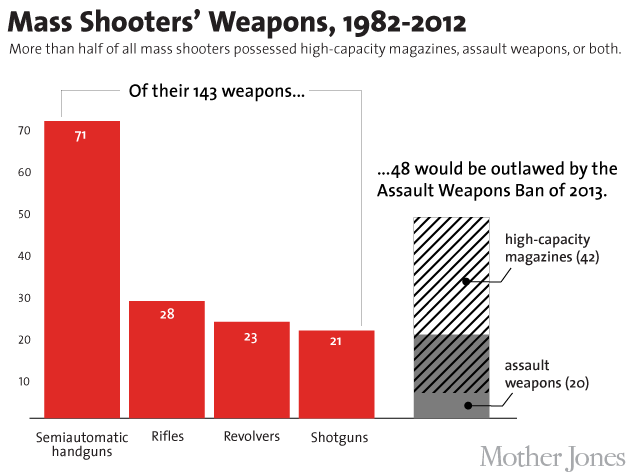Sen. Dianne Feinstein’s new proposal to ban assault weapons may not have much forward momentum in Congress, but in the wake of the Newtown massacre state lawmakers around the country have been moving quickly to impose new gun laws—on both sides of the issue.
On Thursday, the Maryland Senate passed what would be one of the nation’s strictest gun control laws, banning magazines holding more than 10 rounds of ammunition, a range of guns classified as assault weapons, and gun sales to anyone who has spent a month or more in a state mental hospital. If the Maryland House and governor’s office, both controlled by Democrats, sign off on the Senate’s bill, the state would join California, Hawaii, Massachusetts, and New York in outlawing magazines holding more than 10 rounds. (New York’s new law limits gun magazines to seven rounds.) That restriction is the same as the one in Feinstein’s proposal to ban assault weapons and high-capacity magazines, which are popular among mass murderers and street kids alike. Seven states including Maryland already have assault weapons bans on the books.
In the other direction, Tennessee Gov. Bill Haslam is poised to sign a “gun-in-trunks” bill, which his state’s House passed Thursday after a four-year battle, allowing permit holders to bring their firearms to work if they keep them locked in their vehicles.
The two bills are the latest in a slew of gun legislation introduced or revived in more than 40 statehouses since the violence at Sandy Hook Elementary School in December shocked the nation. The first gun control bill to pass since the shooting was the strengthened assault weapons ban signed into law by New York Gov. Andrew Cuomo in late January, the nation’s toughest. Meanwhile, states including Idaho and Mississippi are pushing bills to expand concealed carry laws, which would add to a wave of such laws put in place from Maine to Arizona since 2009.
Although most observers think Feinstein’s bill continues to lack the votes it needs to become law, some conservatives at the state level are preparing for the possibility of the bill’s passage—or perhaps using the prospect of it as an opportunity to press their own agendas. In Kentucky, where a bill passed last summer allowing guns to be carried in more public places has turned the state into a “new Wild West,” in the words of one lawmaker who opposed it, Kentucky’s Senate voted this week to prohibit the enforcement of any new federal gun control laws.
Meanwhile, at the county level, some sheriffs are making noise about bypassing their state legislatures altogether if need be, vowing to go rogue and turn a blind eye to any new gun control laws.
















